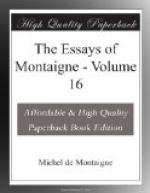of not understanding it, to try, on all parts, how
it is lodged in the author. It may happen that
we entangle ourselves, and help to strengthen the
point itself. I have sometimes, in the necessity
and heat of the combat, made answers that have gone
through and through, beyond my expectation or hope;
I only gave them in number, they were received in
weight. As, when I contend with a vigorous man,
I please myself with anticipating his conclusions,
I ease him of the trouble of explaining himself, I
strive to forestall his imagination whilst it is yet
springing and imperfect; the order and pertinency
of his understanding warn and threaten me afar off:
I deal quite contrary with the others; I must understand,
and presuppose nothing but by them. If they
determine in general words, “this is good, that
is naught,” and that they happen to be in the
right, see if it be not fortune that hits it off for
them: let them a little circumscribe and limit
their judgment; why, or how, it is so. These
universal judgments that I see so common, signify
nothing; these are men who salute a whole people in
a crowd together; they, who have a real acquaintance,
take notice of and salute them individually and by
name. But ’tis a hazardous attempt; and
from which I have, more than every day, seen it fall
out, that weak understandings, having a mind to appear
ingenious, in taking notice, as they read a book,
of what is best and most to be admired, fix their
admiration upon some thing so very ill chosen, that
instead of making us discern the excellence of the
author; they make us very well see their own ignorance.
This exclamation is safe, “That is fine,”
after having heard a whole page of Virgil; by that
the cunning sort save themselves; but to undertake
to follow him line by line, and, with an expert and
tried judgment, to observe where a good author excels
himself, weighing the words, phrases, inventions,
and his various excellences, one after another; keep
aloof from that:
“Videndum est,
non modo quid quisque loquatur, sed etiam quid
quisque sentiat, atque
etiam qua de causa quisque sentiat.”
["A man is not only
to examine what every one says, but also what
every one thinks, and
from what reason every one thinks.”
—Cicero,
De Offic:, i. 41.]
I every day hear fools say things that are not foolish:
they say a good thing; let us examine how far they
understand it, whence they have it, and what they
mean by it. We help them to make use of this
fine expression, of this fine sentence, which is none
of theirs; they only have it in keeping; they have
bolted it out at a venture; we place it for them in
credit and esteem. You lend them your hand.
To what purpose? they do not think themselves obliged
to you for it, and become more inept still.
Don’t help them; let them alone; they will handle
the matter like people who are afraid of burning their
fingers; they dare change neither its seat nor light,




